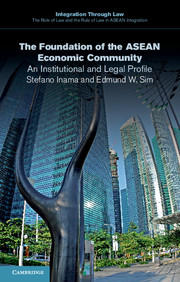4 - Improving ASEAN's institutional tools
Published online by Cambridge University Press: 05 May 2015
Summary
In this chapter, we will discuss various institutional options available to ASEAN leaders as they examine how to proceed with the AEC integration efforts beyond the initial 2015 threshold date. The previous chapters demonstrated that ASEAN's lack of institutional and legal authority and framework leaves much to be desired. Without improvements in these areas that improve predictability and clarity in the regulation of the AEC, private investors will not be convinced that the AEC is acceptable as a single production base for their operations. This is particularly necessary given that many of the issues involving the AEC involve post-border market access, which will require stronger ASEAN institutions that can monitor and address non-compliance with AEC policy. Furthermore, other issues related to border entry are complicated by ASEAN's not having established a customs union. On the other hand, ASEAN leaders do not want to push for greater supranational institutions, given historical and cultural biases in favor of non-interference and the “ASEAN Way” of consensus. Can ASEAN adapt its existing institutions to deal with the challenges? Or are wholesale revisions required? Will modifications to existing ASEAN agreements be sufficient or is a new treaty needed?
Status quo
The ASEAN governments could elect to continue with the status quo. However, this would mean that we would continue to have unclear mandates and muddled analysis of policy issues. This situation has arisen because the current ASEAN system requires the ten member states to cooperate in forming a single production base and single market, but without a single regional authority to regulate the single market and single production base. ASEAN is definitely not a proto-state, but it has progressed beyond an informal grouping, thanks to the introduction of the ASEAN Charter.
Although the ASEAN Charter formalizes the rules and structure of ASEAN, it stops far short of the supranational aspirations of the EU's Treaty of Rome. The Charter provides ASEAN with legal personality but not with legal authority over its members.
- Type
- Chapter
- Information
- The Foundation of the ASEAN Economic CommunityAn Institutional and Legal Profile, pp. 145 - 189Publisher: Cambridge University PressPrint publication year: 2015



